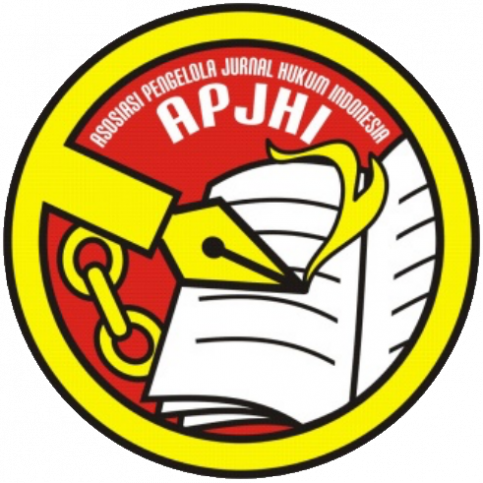FILOSOFI PENYELESAIAN PERKARA PERCOBAAN PEMBUNUHAN MELALUI KEARIFAN LOKAL PADA MASYARAKAT INDONESIA
Abstract
ABSTRAK
Hukum yang hidup di masyarakat telah menyelesaikan tindak pidana yang terjadi di masyarakat. Dalam Pasal 338 KUHP mengenai tindak pidana pembunuhan, dengan ancaman pidana  berupa pidana mati. Masyarakat Indonesia sebagai local wisdom telah menyelesaikan tindak  pidana percobaan pembunuhan dengan kesepakatan para pihak. Tujuan penulisan ini adalah mengidentifikasi dasar filosofis kebijakan lokal dalam percobaan  tindak pidana  pembunuhan pada masyarakat di Indonesia. Metode penulisan adalah normatif dengan pengumpulan bahan hukum secara studi Pustaka dengan pendekatan perundang-undangan dan konsep serta dianalisis secara kualitatif., Hasil pembahasan bahwa Filosofi penanganan percobaan  pembunuhan pada Masyarakat di Indonesia  adalah berupa kesepakatan antara para pihak adalah bertentangan dengan konsep mala in se.  Sanksi tersebut adalah kesepakatan antara pertemuan antara pelaku, korban dan perwakilan masyarakat, hal ini sesuai dengan perkembangan di dalam masyarakat dan hubungan kekerabatan atau persamaan wilayah sangat dijunjung tinggi sebagai tahapan penyelesaian percobaan pembunuhan yang terjadi.
ABSTRACT
The law that lives in the community has resolved the crime that occurred in the community. In Article 338 of the Criminal Code concerning the crime of murder, the threat of punishment is the death penalty. The Indonesian people as local wisdom have resolved the crime of attempted murder with the agreement of the parties. The purpose of this paper is to identify the philosophical basis of local policies in the attempted murder of people in Indonesia. The writing method is normative with the collection of legal materials in a library study with a statutory and conceptual approach and analyzed qualitatively. The results of the discussion that the philosophy of handling attempted murder in society in Indonesia is in the form of an agreement between the parties is contrary to the concept of mala in se. The sanction is an agreement between a meeting between perpetrators, victims, and community representatives, this is following developments in the community, and kinship relations or regional equality are highly respected as a stage of completion of the attempted murder that occurred
Keywords
Full Text:
PDF (Bahasa Indonesia)References
Aesong, Y. D. (2013). Sebab Dan Masalah Kejahatan. 1–18.
Ariefianto, Y. (2016). Penerapan Restoratif Justice Dalam Penyelesaian Kasus Kecelakaan Lalu Lintas. Jurnal Hukum.
Bazemore, Gordon & Schiff, M. (2005). Juvenile Justice Reform and Restorative justice: Building Theory and Policy from Practice. Willan Publishing.
Garner, B. A. (2009). Black’s Law Dictionary, 9th Ed.
Hamzah, A. (2014). Kuhp&KUAP (Edisi Revi). Rineka Cipta.
Hiariej, E. O. (2014). Prinsip-Prinsip Hukum Pidana. Cahaya Atma Pustaka.
Holt, Thomas J & M, B. A. (2008). Examining the applicability of lifestyle-routine activities theory for cybercrime victimization. Deviant Behavior, 30(01), 1–25.
Iriyanto, E. & H. (n.d.). Unsur Rencana Dalam Tindak Pidana Pembunuhan Berencana Kajian Putusan Nomor 201/Pid.B/2011/PN.Mrs. Jurnal Yudisial. https://doi.org/10.29123/Jy.V14i1.402.
Isnandar, A. (2018). Bangunan Hukum Pidana berbasis Kearifan Lokal (Studi Kasus Pengendalian Badan Konservasi dan Sumber Daya Alam). Prosiding Seminar Nasional & Call for Papers Hukum Transendental, 313–324.
Marpaung, L. (2002). Tindak Pidana Terhadap Nyawa Dan Tubuh. Sinar Grafika.
Moeljatno. (2002). Asas-Asas Hukum Pidana. Rineka Cipt.
Moeljatno. (2015). Asas-Asas Hukum Pidana. Rineka Cipta.
Undang-undang Nomor 1 Tahun 1946 tentang Peraturan Hukum Pidana di Indonesia (Kitab Undang-Undang Hukum Pidana), (2010).
Muhammad Ruhly Kesuma Dinata, S. (2021). Kearifan Lokal Dalam Peningkatan Kesadaran Hukum. Echtsregel Jurnal Ilmu Hukum, 4(2), 154–167.
Muladi & Nawawi, B. (1992). Teori dan Kebijakan Pidana. Alumni.
Nur Rochaeti, R. D. S. (2013). Kontribusi Peradilan Adat Dan Keadilan Restoratif Dalam Pembaruan Hukum Pidana Di Indonesia. Jurnal Rechts Vinding: Media Pembinaan Hukum Nasional, 2(2), 161. https://doi.org/10.33331/rechtsvinding.v2i2.70
Pavlich, G. (2002). Towards an Ethics of Restorative Justice, dalam Restorative Justice and The Law, ed Walgrave, L. Willan Publishing.
Undang-Undang Republik Indonesia Nomor 8 Tahun 1981 Tentang Hukum Acara Pidana, (1981).
Undang-Undang Republik Indonesia Nomor 11 Tahun 2012 Tentang Sistem Peradilan Pidana Anak, (2012).
Republik Indonesia. (2016). Undang-undang Dasar Republik Indonesia 1945 (4th ed.). Sinar Grafika.
Sapardjaja, K. E. (2001). Ajaran Sifat Melawan Hukum Materiil Dalam Jili. Odama Indonesia.
Shapland, Joanna & Willmore, J. (1985). Victim in The Criminal Justice System. Gower Publishing Company Limited.
Suringa, H. (1953). Inleading tot de studei van het nederlandse strafrect H.D.Tjeenk Willink & zoon NV-Haarlem.
Ulil, A. U. (2019). Penyelesaian Tindak Pidana Ringan Melalui Kearifan Lokal Dalam Pembangunan Sistem Hukum Nasional. Jurnal Rechts Vinding: Media Pembinaan Hukum Nasional, 8(1), 113. https://doi.org/10.33331/rechtsvinding.v8i1.307
Usman. (2011). Analisis Perkembangan Teori Hukum Pidana. Jurnal Ilmu Hukum Universitas Jambi.
Utrecht, E. (1986). Hukum Pidana I. Pustaka Tinta Mas.
DOI: https://doi.org/10.35194/jj.v3i1.2114
Refbacks
- There are currently no refbacks.
Copyright (c) 2023 JOURNAL JUSTICIABELEN (JJ)

This work is licensed under a Creative Commons Attribution-ShareAlike 4.0 International License.
JOURNAL JUSTICIABELEN (JJ) INDEXED BY:

This work is licensed under a Creative Commons Attribution-ShareAlike 4.0 International License.
Postgraduate Study Program Master of Law, Suryakancana University, Jl. Pasir Gede Raya-Cianjur, 43216, Tel. 0263-270106, Fax. 0263-261383, Email: journal.justiciabelen@unsur.ac.id





1.png)













